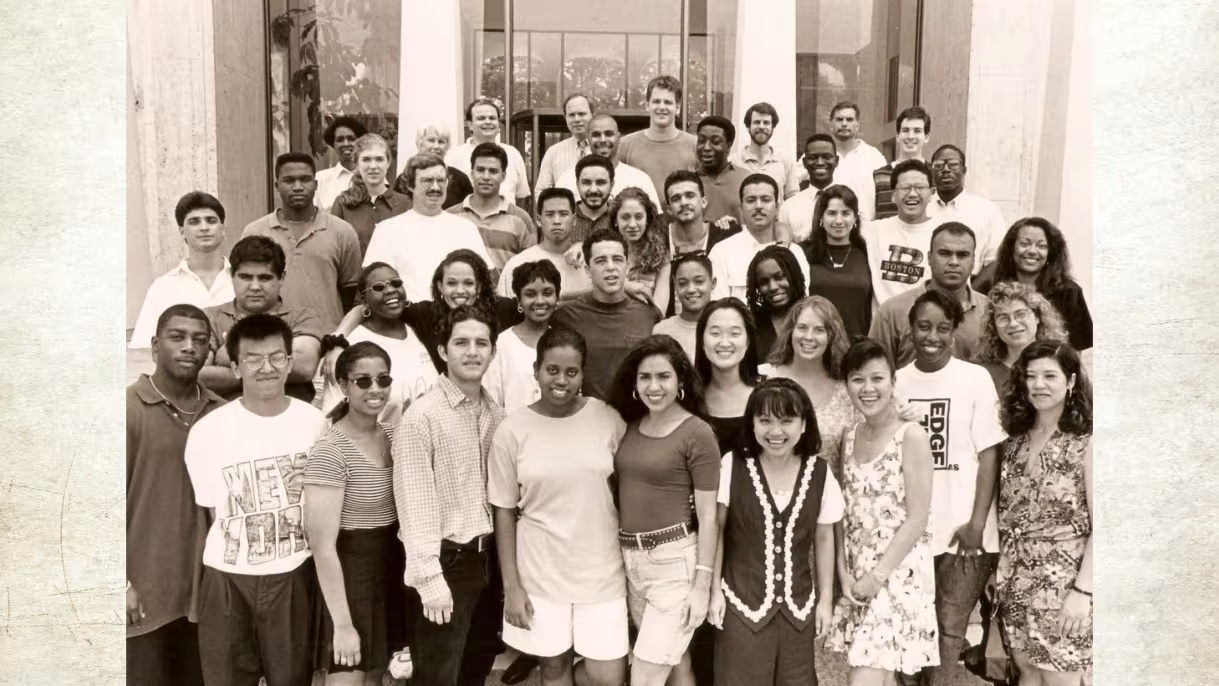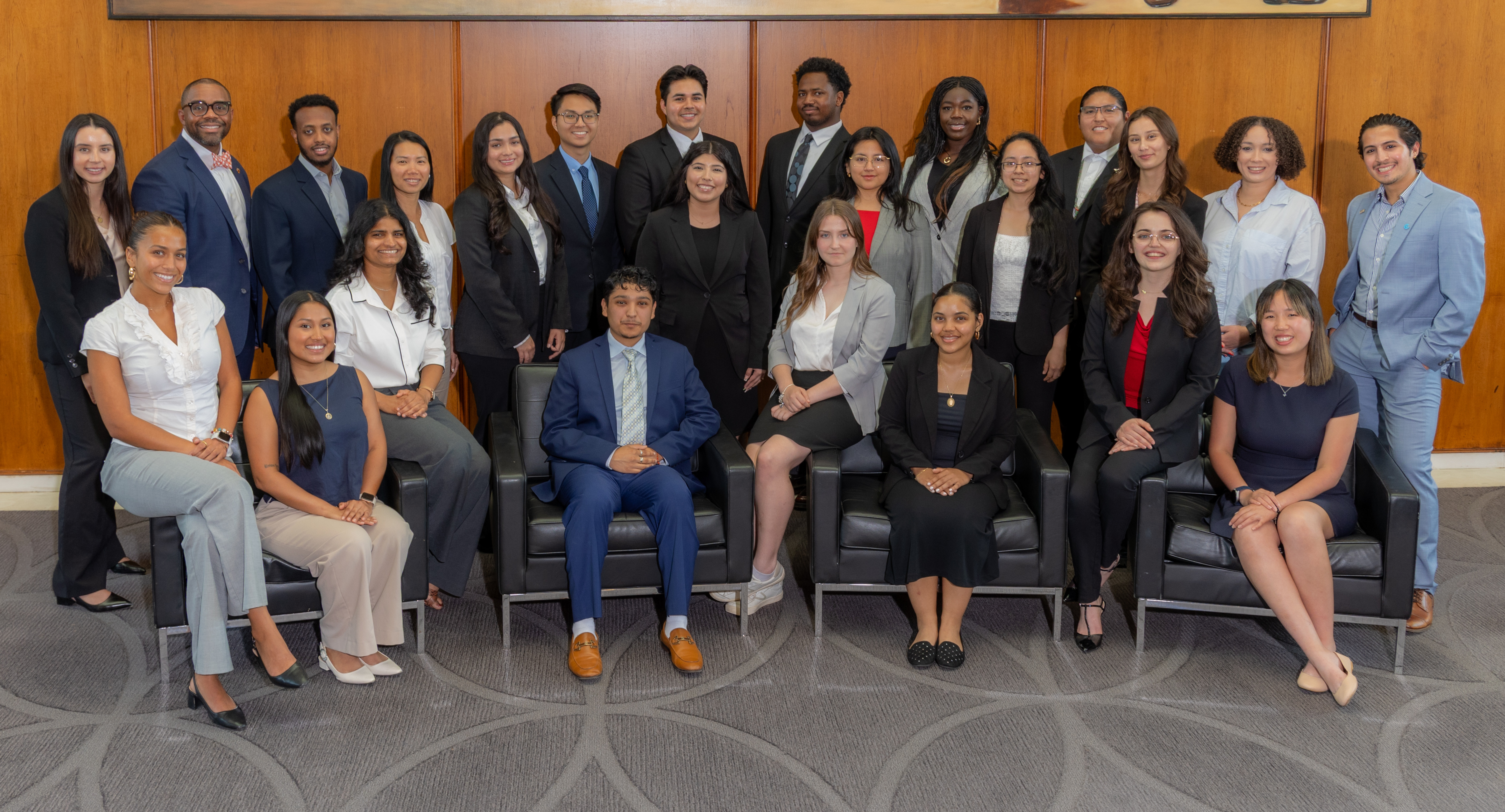

JSI at 40: Alumni Reflect on Expanding Pathways to Policy Leadership
Earlier this summer, the 40th Princeton cohort of the Public Policy and International Affairs Junior Summer Institute (JSI) watched their peers deliver final presentations in a Robertson Hall classroom. The bonds the 19 rising seniors had forged during their seven weeks together – all while studying microeconomics, statistics, public policy research, and domestic and international policy – were on full display.
They praised one another for their presentations and asked probing questions that demonstrated deep interest in the policy matters being discussed – from rare mineral extraction to the tradeoffs between innovation and inequality.
“I loved seeing how the final presentations brought diplomacy to life,” said Carolina Gomma de Azevedo Domingues MPP ’25, a senior member of the United Nations Development Coordination Office who taught the international policy workshop during the program. “It was a real-time test of collaboration, and [the students] rose to the challenge with thoughtfulness and respect.”
The JSI to MPA Pipeline
Since 1985, Princeton SPIA has hosted JSI to give first- and second-generation college students from under-resourced communities around the U.S. exposure to the School’s academic rigor and community-centered programming.
That experience often leads to JSI participants returning in subsequent years to pursue a Master in Public Affairs (MPA) at Princeton SPIA. At least 140 JSI participants have done so since the program began. The 1994 cohort in particular stands out, with 13 students who went on to enroll in the MPA program.
Jose Quiñonez MPA ’98 was part of that JSI cohort. He said the bootcamp experience, complete with “countless sleepless nights,” instilled confidence and determination in him. The founding CEO of the Mission Asset Fund and a MacArthur Fellow, Quiñonez said JSI marked the beginning of his career working to improve the lives of low-income immigrants.
“At every stage of my career, I have drawn strength and guidance from many colleagues in the JSI fellowship,” he said.
Asa Craig MPA ’17 said attending JSI in 2010 was a big reason why he chose to return to Princeton SPIA for his master’s degree.
“What I remembered from that summer was just how personal and close-knit the Princeton community felt,” Craig said. “At Princeton SPIA, we were all in one building, learning together, supporting each other. That spirit of community made a lasting impression, and it was pivotal in helping me decide to return.”
Multiple Paths to Service
JSI also helped Craig see that public service is broad and layered, with an entire ecosystem of analysts, economists, and regulators behind the scenes helping policymakers achieve their objectives. That’s something other JSI alumni have echoed as a lasting lesson from that formative summer.
Christina Henderson MPA ’12 attended JSI in 2007, while she was studying at Furman University in Greenville, S.C. Now a councilmember for the District of Columbia, Henderson says a typical day may require her to jump from discussing transportation policy to stormwater runoff to taxes to school nurses.
She credits her time at Princeton SPIA, beginning with JSI, for the skills and agility to succeed in such a dynamic environment.
“My biggest takeaway from JSI was that having specific policy expertise is okay, but having strong foundational skills as a generalist is also incredibly valuable,” Henderson said.
When Seyron Foo ’14 entered JSI in 2008 after his junior year at UC Berkeley, he thought the main career pathway for public service was law school.
“The summer at JSI really opened up this whole new world of policy making that did not demand a law degree, but actually demanded a multi-disciplinary approach,” he said.
A senior program officer at the Conrad N. Hilton Foundation in Los Angeles, Foo now leads strategic grantmaking for a $45 million annual portfolio to address homelessness in the county.
When he was at JSI, he had the opportunity to meet with alumni who talked about their careers, and Foo said he learned about the philanthropic sector, in which he now works, for the first time.
“It got me interested in there being more than just one pathway to public service,” he said. “When the transition came for me to leave a public policy role and work in philanthropy, it didn’t feel as mysterious because I had heard about it more than a decade before in my JSI experience.”
Greater Diversity in Public Service
Over the course of four decades, JSI has helped expand professional networks for its participants. Like Henderson, Foo said that has been one of the program’s greatest lasting values.
“We talk a lot about networks, who has them and who doesn’t. And we know people with networks tend to end up in leadership positions,” he said.
Foo continues to give back to the School, representing Princeton SPIA in the Princeton Graduate Alumni Annual Giving program. It’s his way of acknowledging the support he received as a student that helped kickstart his career.
JSI doesn’t just give students the opportunity to explore public service; it also helps expose a wider swath of people to public service careers.
“It’s weird to walk into a room where we’re making a very large decision about a budget or a policy item, and I look around and I’m the only woman or I’m the only person of color,” Henderson said. “I think it is valuable when institutions like Princeton remain committed to JSI, because it shows that they are thinking about and are invested in what the future policy world is going to look like.”


